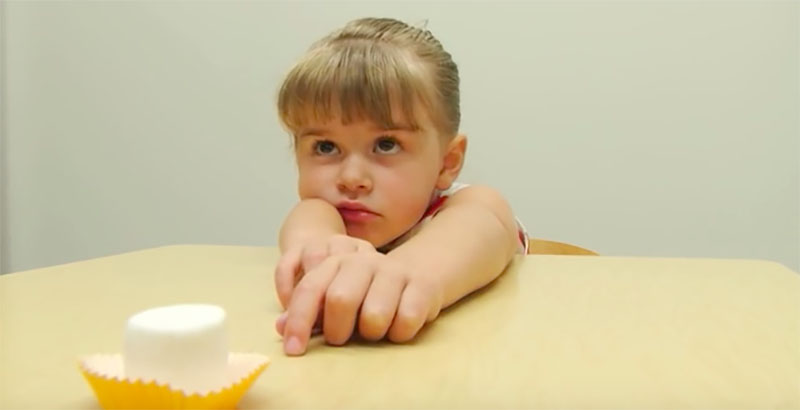In 1972, a group of psychologists at Stanford University led by Dr. Walter Mischel conducted a longitudinal study now well-known as the “Marshmallow Experiment”. The study in delayed gratification was very simple. A five-year-old was placed in a room at a table with a marshmallow on it. The child was told that he or she could either eat the marshmallow now or, if they could wait 15 minutes, they would get two marshmallows later. At that point, the researchers would leave the room to observe the child, hidden from view. The results varied. Some kids gobbled up the marshmallow the moment the doctors stepped out. Others, would smell the marshmallow, touch it, play with it, but still eat it before the 15 minutes were up. A third group of children, however, were able to hold out for the prize. When these same children were observed as adults 40 years later, it was found that those who were part of the last group, who were best able to resist temptation and delay gratification, were much more successful in life than those who had failed the test as children.
The most famous story of the Book of Bereishit is undoubtedly the fall of Adam and Eve when they ate from the Tree of Knowledge. This incident, found in this week’s parasha, has been troubling our sages for centuries. How can man, created Betzelem Elokim, in God’s image, have fallen from grace so badly? Why was the tree placed there in the first place? Why did they not resist?
Bereisit Rabbah (17:4) relates the midrash whereby Hashem challenged the angels to name the animals. The angels were unable to do so, but Adam, with his unparalleled ability to understand the true nature of the living world, accurately named all the animals. As Rabbi Y. Frand points out, in Hebrew, unlike in any other language, the name of the animals reflects the essence of the being. He then asks, however, why was Adam so uninspired in naming man. Why name the creature created in God’s image “Earth”? Rabbi Frand brings down the teachings of the Alter of Slobodka who explains that while Adam showed man to be superior to the angels, he innately understood that it does not take much for man to fall from great spiritual heights to the dirt from which he was formed. It is a constant struggle for mankind to avoid that fall.
Rav Yosef Albo in Sefer Ha’ikrim points out that after each creation, Hashem declares “ki tov”, “it was good”. Yet, after the creation of man, no such declaration is made. This is because man is a work in progress, we are constantly trying to overcome temptations.
In a recent dvar torah, Rabbi Lazer Gurkow of Toronto points out that Hashem wanted Adam and Eve to experience temptation and to struggle with it. “He endowed us with souls far more potent that those he gave to angels…..they would never have cause to tap its potential”. It is through overcoming challenge that we become stronger. It is by honing our self-discipline and teaching ourselves how to resist temptation that we grow.
The Talmud (Berachot 17a) teaches that Sages would part with the words “Olamecha tir’eh”, “May you see your world in your lifetime”. What a gift it would be to be cognizant of our true potential and reach it in our lifetime. The struggle is real. The five-year-olds who successfully resisted temptation did so by talking themselves through the experience. Some sang, some counted, others coached themselves through it. The struggle was real, but the reward, they understood, would be worth it. We are no different. It is a constant inner dialog with ourselves and with Hashem, it is an active effort to resist our yetzer ha’rah and make the right choices. Resisting temptation is definitely challenging, but the reward for doing so is the ability to reach our true potential.
So why tempt man with the Tree of Knowledge? In giving man this struggle to overcome temptation and natural inclinations, He has given us the greatest of gifts: the ability to reach and grow and rise to our true potential.
And so, as we roll the Torah scrolls back to the beginning this Shabbat, I wish you all “Olamchem tir’u”!
Shabbat Shalom,
Dr. Laura Segall
Head of School

